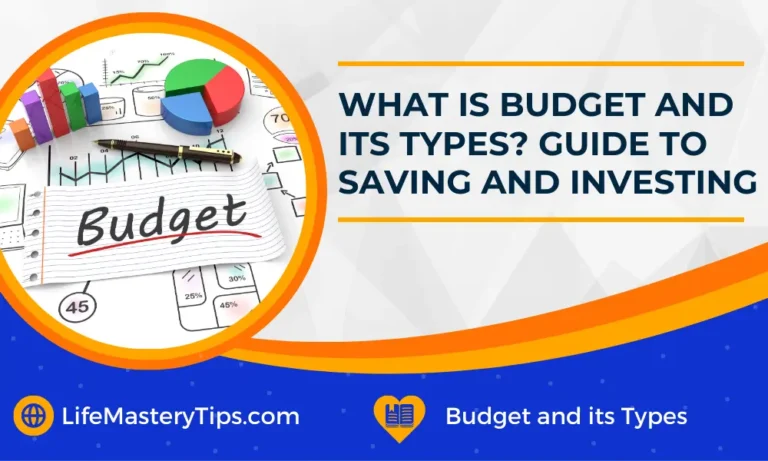A crucial question that people must ask themselves when it comes to managing their own money is “What is Budget and its Types?” There are several sorts of budgets that may be used to do this, and budgeting entails developing a strategy for dividing up income and spending. Each budget model has advantages and disadvantages of its own, whether it be a classic or zero-based budget, a rolling or incremental budget, or a performance or activity-based budget. Achieving financial success and security requires an understanding of the various budgeting methods and how to apply them efficiently.
Budgeting is a crucial component of money management that may greatly influence our lives. It entails budgeting and arranging our financial resources in a way that both meets our financial objectives and guarantees we have enough money to pay for our daily costs. We’ll explore what budgeting comprises and its types as we go deeper into the topic in this article.
We’ll also offer advice and techniques for investing and saving money, which can eventually lead to stability and security in our financial situation. This article is intended to provide you with the information and tools necessary to make wise financial decisions, regardless of your level of experience or where you are in the process of managing your finances.
What is a Budget?
Essentially, a financial plan acts as a directional guide for your monetary resources. It involves devising a systematic approach to how much revenue you’re projected to amass and exhaust over a specific duration, such as a month or a year. If you’re budgeting for your entire household, the financial plan is known as a family budget.
There are many different budgeting strategies you may use. You may either compile a detailed list of every expense you intend to incur or you can concentrate on particular categories. While some people prefer using a spreadsheet or budgeting application, others prefer writing down their budgetary plan by hand. In essence, there is no one approach that is considered “correct” for budgeting.
Having said that, we’re quite fond of a budgeting technique known as the 50/30/20 budget. Essentially, it advocates spending around 50% of your monthly earnings (after taxes) on necessities like rent or groceries. Roughly 30% can be apportioned to things you desire but don’t necessarily require, such as dining out or purchasing new clothes. The remaining 20% should be invested towards savings or repaying any outstanding debts.
Why is it Called a Budget?
Budget is a term that refers to the approximation of forthcoming revenue and expenses over a given period. It is generally compiled and assessed periodically and is applicable to any entity that is willing to allocate funds, including individuals, households, businesses, and governments.
In order to effectively manage monthly expenses, prepare for unforeseen events, and avoid incurring debt when purchasing big-ticket items, budgeting is crucial. Keeping a record of earnings and expenditures does not necessitate arduous effort, exceptional mathematical ability, or a restriction on one’s ability to purchase desired items. Rather, it provides a clear understanding of where money is being spent and empowers individuals to exercise greater control over their finances.
Here’s a technique to safeguard yourself against your own spending habits if you’re still not certain that budgeting is right for you. Set up an automated transfer from your checking account to a savings account at a separate bank that you won’t notice, to take place as soon as you receive your paycheck.
The Difference Between Saving, Investing, and Speculating:
Which will Best Define Budgeting?
The process of allocating resources, both financial and non-financial, with the goal of reaching a particular outcome might be defined as “budgeting.” It requires forecasting future costs and income sources and making wise choices about how to effectively use one’s limited resources to achieve one’s objectives.
Others could see budgeting as a continuous and adaptable financial planning activity that calls for a blend of strategic vision and quick reaction to changing economic and personal conditions. In the end, the broadest definition of budgeting could incorporate components from all of these viewpoints while also taking into account how different and constantly changing budgeting practices are in many settings and applications.
Types of Budget
Personal Budget: To avoid running out of money before the next payday, a person or family budgets their monthly income and spending.
Corporate Budget: It is a strategy for effectively maintaining cash flow, operational cash, and emergency money. It consists of manufacturing, production, material, and sales overheads.
Labor Budget: For businesses that use a lot of labor, it is ideal. Businesses that depend largely on their workforce require a methodical strategy for balancing income and salaries.
Government Budget: The federal government’s financial plan takes into consideration the anticipated level of national income for a certain financial or fiscal year. Taxes, fees, and grants are the sources of funding. It also takes into account the budgeted costs for infrastructure and public services. Federal budgets come in two types: capital and income.
Financial Budget: It includes shareholders’ equity as well as assets and liabilities. It outlines the short- and long-term financial objectives of an organization.
Master Budget: It is the result of several lower-level budgets created for various company processes. A comprehensive business strategy, that is.
Static Budget: Most of the time, it is created by governmental and nonprofit institutions. It is inflexible and forbids modifications based on the institution’s operations. It is a forecast of earnings and costs based on expected values. The actual findings can differ from the values expected.
Operating Budget: It is made at the start of a certain era. It displays the accounts for fixed, non-operating, variable, and capital expenditures from the profit and loss.
Flexible Budget: It is a pragmatic strategy used by companies. A flexible plan adapts in accordance with changes in expenditures and spending during the course of the time.
Cash Budget: It is merely an anticipated cash flow. It lists the future period’s estimated payables and receivables. It is prepared to make sure that the company has adequate cash on hand to operate smoothly.
There are numerous budget categories, and each has a distinct function. Whether it’s budget for a person, business, or government, the objective is always to manage money effectively and efficiently. Individuals and corporations may make wise financial decisions and maintain financial stability by having a solid understanding of the various budget kinds.
The Four Main Types of Budgets
There are four standard budget categories used by businesses: incremental, activity-based, value proposition, and zero-based.
1. Incremental budgeting
Using incremental budgeting, the current year’s budget is created by taking the actual figures from the previous year and adding or subtracting a percentage. Because it is straightforward and simple to comprehend, it is the most typical type of budget. If the main cost drivers stay the same from year to year, incremental budgeting is the right approach to take.
2. Activity-based budgeting
A top-down budgeting method known as “activity-based budgeting” works by calculating the number of inputs needed to support the objectives or outputs that the organization has established. For instance, a business sets a revenue output goal of $100 million. The business must first identify the tasks that must be completed in order to hit the sales goal before calculating the associated expenses.
3. Value proposition budgeting
Value proposition budgeting is basically just a way of thinking about making sure that everything in the budget adds value to the company. Value proposition budgeting seeks to prevent wasteful spending, however less accurately than our preferred choice for budgeting, zero-based budgeting.
4. Zero-based budgeting
Zero-based budgeting, one of the most popular budgeting techniques, begins with the premise that all department budgets are zero and must be established from the beginning. Every cost must be able to be justified by managers. No expenses are “okayed” automatically. Zero-based budgeting is extremely strict, with the goal of avoiding any and all expenses that are not seen to be absolutely necessary for the effective (profitable) functioning of the organization. This bottom-up budgeting strategy has the potential to “shake things up” in a big manner.
What is Budget Control?
Budgeting control is the procedure a business uses to monitor actual expenditures versus projected budgets. In addition to assisting in controlling spending, this enables firms to produce more precise budgets and increase their earnings.
When a budget is created, it’s crucial to monitor it to make sure your actual performance is in line with the original strategy. Strong budgetary management enables you to monitor and compare spending to the original projection. To keep your business operating at a low cost, this method also promotes responding to any deviation.
Although manual reviews can be done on a monthly, quarterly, or annual basis, budgetary control is a continuous process. As an alternative, computerized management accounting will notify decision-makers when action is necessary.
Conclusion | What is Budget and its Types? Guide to Saving and Investing
The ability to properly save, invest, and manage one’s finances is made possible by having a budget. In order to find areas where spending can be cut down on and savings can be increased, a budget helps to paint a clear picture of income and costs. Whether it’s debt repayment, home ownership, or retirement planning, people may achieve their financial objectives by making and adhering to a budget.
Budgets come in a variety of forms, and each has certain benefits and drawbacks. It’s crucial to pick a budgeting strategy that complements your way of life and your financial objectives. In order to succeed financially, budgeting ultimately comes down to developing a habit that calls for self-control, reliability, and a readiness to adapt.




